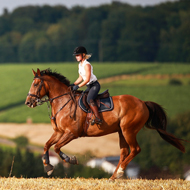Heat affects speed of horses more than humans - study

The researchers analysed three international races in which humans and horses were pitted against each other.
A study by researchers at the University of Roehampton suggests that the speed of horses deteriorates in hot weather faster than it does in human beings.
Scientists analysed the effect of ambient temperature on the running speeds of humans and horses in races where the two species were pitted directly against each other.
Race times from three ‘Man v. Horse’ international races involving 260 humans and 358 horses with riders on courses of over 30 km in length were analysed. Researchers also looked at ambient race-day temperatures from archived weather records at the nearest weather station of similar elevation.
They found that for every 1ºC increase in ambient temperature on the day of a race, the pace of the horses decreased by on average 0.11 km/h. For humans, it decreased by 0.07 km/h - a 36 per cent smaller decrease.
At the highest race day temperatures, the quickest human runners were nearly as fast as the fastest horses.
Commenting on the findings, professor Lewis Halsey from the University of Roehampton and co-author independent researcher Dr Caleb Bryce, said: “Horses have superior cardiovascular systems to humans so it is not surprising that they are typically faster than humans in a head-to-head race. Yet the time gap between the two closes on hotter days.
“This finding was sometimes subtle but always apparent in each of the three race events we analysed. In simple terms, humans sweat more readily so they have an in-built cooling system which mitigates the effect of the heat. Horses are bigger, and don’t dump heat as effectively.”
They continued: “Although it’s a dying tradition, some human populations have hunted successfully by out-enduring their prey, running down large animals over the course of many hours in the heat of the day. It’s contentious as to whether humans are adapted specifically to do this, but the man versus horse data does suggest that humans are relatively well equipped to endure long-distance running at high temperatures.”



 The veterinary mental health charity Vetlife is inviting the veterinary community to join it for a sponsored cold-water dip.
The veterinary mental health charity Vetlife is inviting the veterinary community to join it for a sponsored cold-water dip.